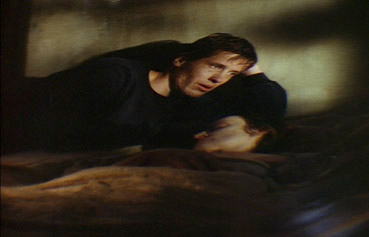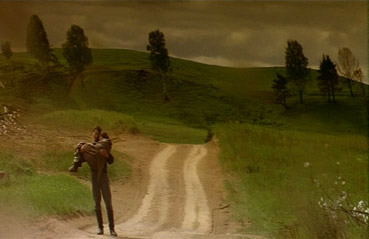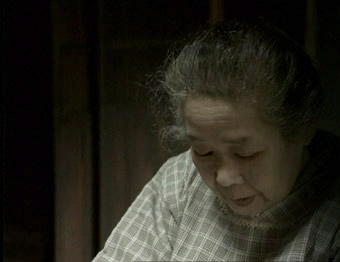|
Mother
and Son
is one of those films that provides a genuine challenge
to anyone attempting to clearly define exactly what it is that
makes it so damned special. As a reviewer, you get used to
dealing in the traditional elements of narrative cinema,
things like pace, story, humour, dialogue, action and tension.
But consider the following plot summary:
A
loving and dutiful son comforts his dying mother in her
final days.
And
that's it. Story wise there's nothing else to it. They sit,
they talk, he carries her into the woodland that surrounds
her isolated home and later leaves her to rest and walks
by himself. There, I've covered just about everything except
the fine detail. And it's paced so slowly that everything
but the soundtrack intermittently comes to a complete halt.

And
yet Mother and Son is a beautiful and intensely
moving cinematic experience. Director Alexandr Sokurov (Russian
Ark, The Sun)
is not interested in giving this event a familiar dramatic
context, but instead has chosen to capture the essence and
emotion of the experience, visually and aurally exploring
the all-encompassing feelings of love and impending loss
that come from watching someone that close to you fade from
the world.* There is no set-up, no pre-event character building,
no sudden revelations or twists – this is cinema pared down
to its narrative basics.
From
the start, the location is as much a character in the film
as the two human protagonists, the woodland setting isolating
and focussing our attention on the two principal characters and theirs on each
other, its visual and aural majesty reflecting a heightened
sensory awareness of surroundings that are soon to be lost
forever. It's this element that gives the film is very specific
and hypnotic hold, and one that will strike a particular
chord with anyone who has comforted a loved one in their
final hours. Such an experience makes you acutely aware
of things you may have previously taken for granted, of
the way the sunlight hits the landscape, of the sound of wind
or rain on trees, of the colours the sky cycles through as
a storm approaches, of nature's unhurried longevity and
of our relative insignificance in its cycle. It's something
the son here repeatedly pauses in his tracks to acknowledge
and appreciate, and when he later wanders alone into the
woods and allows his grief to overwhelm him, the emotional
power of the sequence comes not from a traditional facial
close-up, but his long-shot placement in a landscape that
offers comfort and even abstract support, but that cannot
share in his loss.
Aleksei Fyodorov's consistently extraordinary cinematography
renders the intimate and the everyday with the light and
compositional beauty of the Caspar David Friedrich paintings
that were the acknowledged inspiration for the film's aesthetic,
the angular anamorphosis of many shots an expressionistic
realisation of that disorientating sense that the foundations
of your emotional world have begun to crumble and slip away.
Equally evocative is the soundtrack, which brings to the
fore the traditionally background sounds of nature with
an aural precision that is sometimes startling, and Mikhail
Ivanovich's haunting, drifting score never strays even close
to sentimentality.

Throughout film history, the death of a loved one has been
used to manipulate audiences for dramatic purpose.
Relying primarily on the heightened emotional reactions
of the cast, some very specific camera angles, and a music
score that tells us in no uncertain terms just what we should
be feeling, it's a formula familiar enough to qualify as cliché,
a cinematic blunt instrument that demands we feel for the
unreal. And you know what, even us more cynical film fans
sometimes still succumb – if we care enough about the characters
then we really can feel for their loss. In Mother
and Son, Sokurov strips away the dramatic baggage,
and in the process achieves a purity and truth that is genuinely
overwhelming. It's as far from the standard western cinema
approach as you could expect, but this has not proved
a barrier to international appreciation of the film's considerable
achievement. In an interview with critic Amy Taubin, seeing the film prompted Martin Scorsese to ask a most pertinent question: "There's a new Sokurov film Paul Schrader told me about. This is also cinema. Why can't America make cinema like that?"
The
letterboxed transfer here (it measures a somewhat unusual
1.54:1 on my reading) has clearly been sourced from a German
original (the film is a Russian/German co-production), and
as with some other Sokurov films, the actual image quality
is hard to judge with any real accuracy due to the director's
very specific manipulation of the visuals – my initial suspicion
that all was not well with Artificial Eye's DVD of The
Sun, for example, was laid to rest when I saw
exactly the same, deliberately washed-out and darkened look
on the cinema print. Definition is good in places and softer
in others, notably wide exteriors, while dusts spots tend
to come and go, perhaps indicating reel changes, a favourite
gathering spot for dirt and damage on film prints.
Sound
is so important to the film's effectiveness and the Dolby
stereo 2.0 track here is just lovely, pristine in clarity
and displaying a tonal range and separation worthy of a
good 5.1 mix.
A
Humble Life / Smirennaya zhizn (76:18)
Now here's an odd thing. I'm used to discovering a whole
range of supporting material under a DVD's Extra Features
banner, from interviews to featurettes to short films. But
I don't recall ever finding a feature-length work by the
same director there, one whose running time actually exceeds
that of the main film.
A
Humble Life is certainly true to its title, a documentary
study of the day-to-day world of Umeno Mathuyoshi, an old
woman who lives in an isolated mountain house in the Nara
prefecture in Japan. Her real name is only revealed at the
end, with the male Russian narration identifying her as Hiroko,
a lost love in what at first appears to be letters and memories.
Later indications, however, suggest we are listening to the words
of Umeno's late husband's spirit, who has returned to the house
to observe his wife in her simple daily rituals. Thus, the
camera lingers at length as Umeno brushes her hair, eats
a meal, warms her hands against the cold that penetrates
the house, or sews a funeral kimono, her only source of
income.

There
is certainly a logic to the film's pairing with Mother
and Son. They were made the same year, are similar
in pace and tone, have at their centre a woman at the twilight
of her life who is living in relative isolation (a
trio of chanting monks in search of charity and a moped
that wakes her from a momentary doze are the only things that connect us with the
outside world in any way), and a heightened awareness of
the sounds and imagery of nature – birds, a fluttering moth
or a crawling insect are as prominent as thunder or falling
rain.
In many ways, A Humble Life exerts a similarly
hypnotic hold to Mother and Son, but the
balance here is not quite as finely judged. Sokurov's long
close-up drifts across Hiroko's face and hands do occasionally
become a little repetitive, suggesting a fascination on
the director's part with the texture and detail of her features
and skin that some will regard as bordering on the morbid. But
as a whole, it has a similarly poetic quality to the main
feature, and certainly equals it in the captivating beauty
of its observational detail. It also has its own emotional sting,
delivered by the woman in the final five minutes when she reads
aloud what we assume are her own views on her life and feelings,
her sense of loss and loneliness captured in a few carefully
chosen words of haiku.
Shot on Betacam SP and framed 4:3, the image has been drained
of primary colours, but contrast and detail are generally
good, although there is what looks like grain here and there
and the occasional picture jitter, suggesting this transfer
was sourced from a film print rather than the video master.
The soundtrack is once again striking in its clarity, mix
and tonal range – distant thunder has impressive bass –
but is a little clipped in sequences of Umeno working.
Also
included is a brief biography
and filmography of Alexandr Sokurov.
A
genuinely remarkable unification of art, poetry, nature
and humanity, Mother and Son is unique
and beautiful cinema, a bold and visionary demonstration
that film does not have to be about story or character to
exert a powerful emotional punch. As for Artificial Eye's
DVD, well a pristine anamorphic transfer free of dust spots
would have been nice, but I've no complaints with the soundtrack
or that extra feature – indeed, I'm still surprised the
release wasn't marketed as a Sokurov double-bill, which
is essentially what you get here. For that and the unique
quality of both films, this release has to come recommended.
|